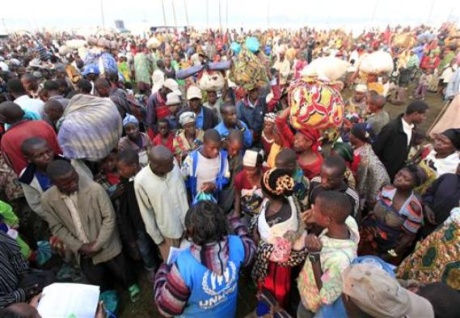
Wednesday, December 19, 2012
By Astrid Zweynert

Refugees from eastern Congo prepare to board buses at Nyakabande refugee transit camp in Kisoro town 520 km southwest of Kampala, July 10, 2012. REUTERS/James Akena
The two men are lucky because Uganda allows refugees to work as part of a “self-reliance” strategy based on the simple logic that this is better for the host nation’s economy than putting them into camps where they have to rely on aid handouts.
Martin employs two people, a Ugandan and another Congolese refugee. Ali, who set up his business with financial help from his brothers in Britain after he was forced to flee war-torn Somalia, employs local people and buys his goods from Ugandans.
None of this would have been possible if they had been stuck in a camp, or if Uganda, like neighbouring Kenya, prohibited refugees from working.
“We tend to think of refugees as a homogenous group but they are extremely diverse and their skills are very diverse….but we often suppress those skills and talents when we insist that refugees need to be in camps or settlements, “ Alexander Betts, a lecturer in refugee studies at Oxford University, told AlertNet.
The particular experience of being a refugee means many of them are “natural entrepreneurs”, he added. “Refugees are people who have had to struggle and adapt in order to survive. They’ve had to travel to a foreign country and apply and use their skills in a new context, usually outside the mainstream economy”.
This entrepreneurial drive is even noticeable in refugee camps, Betts said. In Kenya’s sprawling Dadaab camp, with an estimated 460,000 refugees, people trade in food, household items and services.
But their ability to make a sustainable living out of it is severely restricted compared with Uganda, where refugees have the right to work and some freedom of movement.
SUSTAINABLE SOLUTIONS
Betts launched the Humanitarian Innovation Project (HIP) last month with the aim of tracking and documenting how refugees in countries like Uganda have thrived through their own entrepreneurial drive coupled with the right to work.
The project will also look at innovative measures needed to help refugees expand their enterprises and stimulate the economies of their host countries, such as access to education, credit and incubators to make it easier to start up a business.
“Our hope is that by documenting that it works in a country like Uganda, it can help to change attitudes among other governments,” said Betts.
HIP works in partnership with the United Nations refugee agency (UNHCR) and "Return on Innovation", a U.S.-based non-profit organisation. The project is funded by Texan oil millionaires Stephanie and Hunter Hunt.
With more and more refugees living in camps for many years, UNHCR is struggling to find funds for long-running refugee problems as more acute crises, such that in Syria, where tens of thousands of people are fleeing the civil war every month, attract more attention from the public and donors.
As a result the UNHCR has increasingly been promoting self-reliance, but many projects lack adequate resources to capitalize on refugees’ skills and ambitions, said Olivier Delarue, head of the UN refugee agency’s private sector partnership scheme, which is supported by the IKEA Foundation, the charitable arm of the Swedish furniture maker.
The role of the private sector in helping refugees, in particular in protracted crises, is only gradually being recognised, Delarue told a recent “Refugee livelihoods, innovation and the private sector” conference in Oxford, organised by HIP.
“We have very complex issues ahead of us,” said Delarue. ”It makes sense that we don’t reinvent the wheel but take ideas from the ground, from people who are already there in those situations.”
One example of successful private sector involvement is Uganda’s Technology for Tomorrow, a private company that has formed a partnership with the UNHCR to provide a sustainable livelihood for refugees.
Using local materials and employing refugees as well as Ugandans, the company produces the Makapad, an environmentally friendly sanitary towel. It sells the pads to the UNHCR to be distributed in refugee settlements in Uganda.
*Martin and Ali are not the real names of the refugees mentioned in this story. They took part in a case study by Refugees Study Centre at Oxford University, published in November 2012. Find out more here.